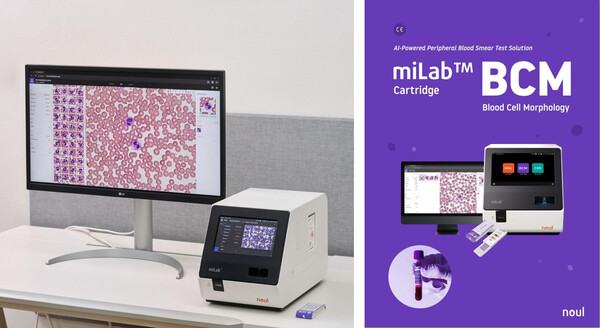Noul, a Korean AI-based blood and cancer diagnostics company, said Monday that it will supply its AI-powered blood analysis solution, miLab BCM, to major hospitals and diagnostic centers in Italy. The names of the institutions remain undisclosed due to confidentiality agreements.
This marks the first European sales case for miLab BCM and follows the delivery of Noul’s microscopy-based malaria diagnostic solution, miLab MAL, to Italy in May. A company official said the latest purchase reflects the product's strong performance and reliability.

As Italy grapples with a rapidly aging population, the demand for chronic and geriatric disease management has risen, leading to a growing need for routine blood tests.
Kim Tae-hwan, Noul’s chief business officer, described miLab BCM as the "world’s only fully automated solution capable of accurate diagnostics across labs of all sizes, requiring minimal infrastructure and specialized manpower."
Kim added that Noul is in ongoing contract negotiations with several European customers, whose names were not disclosed, and expects to secure additional agreements in major markets across the region.
miLab BCM is designed to replace the peripheral blood smear (PBS) test, of which approximately 680 million are performed globally each year. The solution fully automates the blood testing process, identifies morphologically abnormal blood cells with precision, and provides digital images of each cell.
By offering a cost-effective and efficient alternative to traditional, labor-intensive blood tests, miLab BCM is gaining recognition for streamlining workflows in diagnostic laboratories of all sizes, the Noul official said.
The global blood testing market, valued at 7.6 trillion won ($5.4 billion) in 2023, is projected to reach 10.7 trillion won by 2028, with a compound annual growth rate (CAGR) of 7.1 percent. An increased adoption of automation and digitization in diagnostics is driving this rapid expansion.
Noul has already secured regulatory approvals for miLab BCM in Europe, the Association of Southeast Asian (ASEAN) region, and the Middle East. The company is also pursuing FDA approval in the United States while expanding its R&D efforts to include diagnostic solutions for blood cancers such as leukemia.
Related articles
- Noul showcases AI-powered malaria diagnostic tool with superior accuracy at US meet
- Noul’s blood analysis solution wins medical device license in Korea
- Noul inks supply agreement for AI-backed blood analysis solution in Indonesia
- Noul wins Saudi approval for class 3 AI-backed device to aid malaria diagnosis
- MVITRO’s needle-free blood sampling device ORTIV wins FDA approval
- Noul secures FDA Class 1 approval for miLab diagnostic solutions
- Noul signs supply agreement with Germany's Limbach for AI diagnostics
- Noul to showcase AI-based blood and cancer diagnostic platform at CES 2025
- Noul eyes US, Europe expansion in AI diagnostics, aims for profitability by 2027
- Noul to supply AI diagnostics for Kuwait’s upcoming nationwide malaria program

